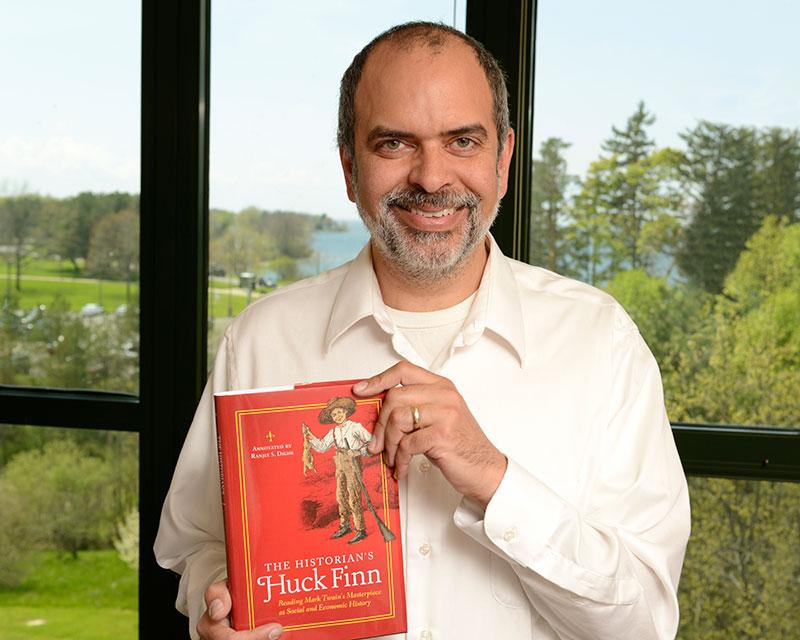Huck as history—Praeger Publishers recently released “The Historian’s Huck Finn: Reading Mark Twain’s Masterpiece as Social and Economic History” by Ranjit S. Dighe, professor and chair of economics at SUNY Oswego. It follows Dighe’s “The Historian’s Wizard of Oz: Reading L. Frank Baum’s Classic as Political and Monetary Allegory” in the Historian’s Annotated Classics series.
Slavery, corrupt banks, confidence games—all of those 19th century evils and many more issues of the day glide through “The Historian’s Huck Finn: Reading Mark Twain’s Masterpiece as Social and Economic History” by SUNY Oswego economics professor Ranjit S. Dighe.
The newly released addition to Praeger Publishers’ the Historian’s Annotated Classics series sweeps down the Mississippi with Huck and Jim, imparting lessons of the past for readers of the present in commentary-style footnotes that unravel the classic novel’s subtext.
Dighe, editor of the series for Praeger, earlier wrote “The Historian’s Wizard of Oz: Reading L. Frank Baum’s Classic as Political and Monetary Allegory.” He said historically annotated novels have a place in social sciences classrooms and on history buffs’ shelves.
A SUNY Oswego faculty member since 1997, the same year he finished his doctorate in economics at Yale University, Dighe said he has used “Adventures of Huckleberry Finn” to supplement his course in “American Economic History Before 1900.” His strategy is to make the book available in the college’s Penfield Library and to stretch assignments out over weeks so that students have the resources and time to read it and to apply its lessons to their coursework.
Dighe said there are many ways to tie the book to the headlines and policies of today. For example, “Twain delighted in a crooked bank story”—the free-banking system of the latter 19th century gave rise to many abuses. The book also touches on the swindlers, phony preachers and snake oil salesmen who populated Mississippi River vessels and towns.
“I don’t remember when I read ‘Huckleberry Finn’ all the way through for the first time, but by now I have lost count of the number of times I have read it, and I enjoy it even more each time,” he said.
Dighe counseled that rigorous research is essential. “Good history is good storytelling, but a lot of storytelling is bogus history,” he said. “So you want to be careful with that.”
Researching “Huckleberry Finn’s” roots sent Dighe to read as much Twain as possible, then sent him and his wife on a journey last year to retrace the character’s—and the famed author’s—footsteps across the Midwest of today through the lens of Twain’s time: Hannibal, Missouri; Cairo, Illinois; New Orleans along the river; Louisville and Cincinnati and other towns along other rivers. Libraries, newspapers and museums dotted the way. The couple made a separate daytrip to the octagonal building at Elmira College where Samuel “Mark Twain” Clemens worked on the novel.
Reviewers applauded both the research and the approach. “Ranjit Dighe has done a brilliant job of annotating ‘Huckleberry Finn,’” wrote Hugh Rockoff, distinguished professor of economics at Rutgers University. “He explains all of the obscure terms and references, but also puts Huck and Jim’s journey into the larger context of the political and economic history of the United States. It is all here: slavery and emancipation, tobacco and cotton, smallpox, steamboats, financial speculation, politics, and much, much more. Highly recommended.”
David P. Parker, professor of history at Kennesaw State University, praised the book for its relevance to modern times. “This book should be of interest to Twain fans, students of American history and literature, and anyone interested in understanding contemporary issues in American society,” Parker wrote.
Dighe plans a book talk and signing for “The Historian’s Huck Finn” at 7 p.m. Sept. 15 at the River’s End Bookstore in Oswego. The book is also available in Penfield Library.




